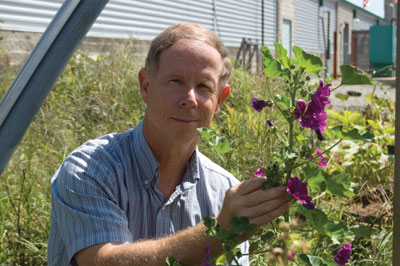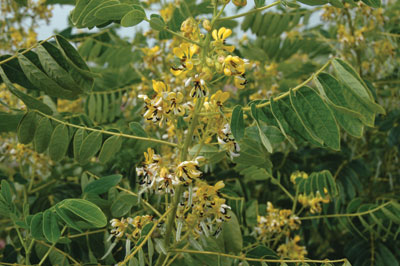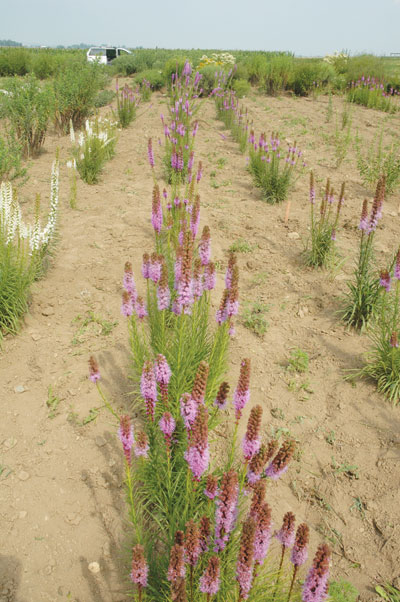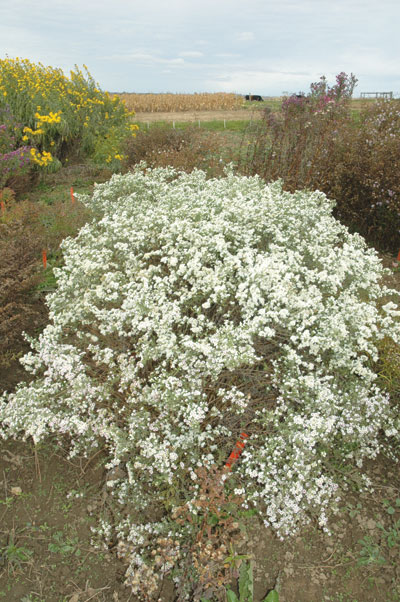
Almost all the plants currently being grown in Canada’s ornamental industry are imported from other countries.
Almost all the plants currently being grown in Canada’s ornamental industry are imported from other countries. As a result, most Canadian growers pay royalties for the majority of their flower species. A University of Guelph researcher suggests Canadian growers could reap many benefits by bringing their focus back to native Canadian species.
 |
|
| Professor Alan Sullivan of the University of Guelph says that “plants native to Canada are, in most cases, ‘low input’ species.” PHOTO BY NICOLE YADA, SPARK Advertisement
|
Plant Agriculture Prof. Alan Sullivan believes that growing species native to Canada could reduce the need to import and cut certain external costs growers have had to pay. Since 2005, Sullivan has been focusing on maximizing the native Canadian flower species growers are using for ornamental plant production.
He and his team of researchers are able to determine whether a native plant is ideal for such things as greenhouse production, cut flower sales, home decoration or in landscaping designs.
Sullivan’s research involves some of the most common species native to Canada – malva, echinacea and trillium.
‘MARKET OPPORTUNITIES ARE BASICALLY WIDE OPEN’
“When we’re working with these native species, we’re always evaluating them to see what their potential would be. Those market opportunities are basically wide open, so it’s up to us to identify them.”
 |
|
| Senna
|
|
 |
|
| Liatris
|
Sullivan believes the native species represent groups of plants that no one has ever really worked with before. This gives growers an added advantage by enabling them to patent the rights to growing the species in commercial greenhouses.
Another benefit to growing Canadian species is that flowers native to Canada are known for being low-maintenance plants.
“Plants native to Canada are, in most cases, ‘low input’ species,” says Sullivan. “They do not require as much water, fertilizer or maintenance compared to some of the non-native species that many growers currently produce.”
Some are naturally hardy to challenging conditions and can flourish in harsh, natural environments. Some of the more popular tropical or semi-tropical non-native species are not as resilient and require more maintenance to thrive.
LOWER WATER, LIGHT, FERTILIZER AND ONGOING MAINTENANCE COSTS
Sullivan says low-input species can significantly reduce costs for growers in terms of water input, light, fertilizer and time spent maintaining the plant. Perennials such as liatris, columbine, aster and lupin are adapted to many of the environmental stresses that occur in Canada. These species are used to experiencing lower maintenance and inputs, and have adapted to these conditions.
 |
|
| Aster
|
“Many of these species are esthetically pleasing and have excellent market potential,” says Sullivan. “But growers and flower distributors just need to know where to look and which species to consider for specific uses.”
Trials for this research take place at the Elora Research Station and the Edmund C. Bovey building greenhouses at the University of Guelph. Collaborator Prof. Praveen Saxena, Department of Plant Agriculture, is a major contributor to this project through his work with in vitro tissue culture methods for propagation.
Funding for this research is provided by the Ontario Ministry of Agriculture, Food and Rural Affairs, and Flowers Canada (Ontario).
Johnny Roberts is a student writer with the SPARK (Students Promoting Awareness of Research Knowledge) program at the University of Guelph.
Print this page